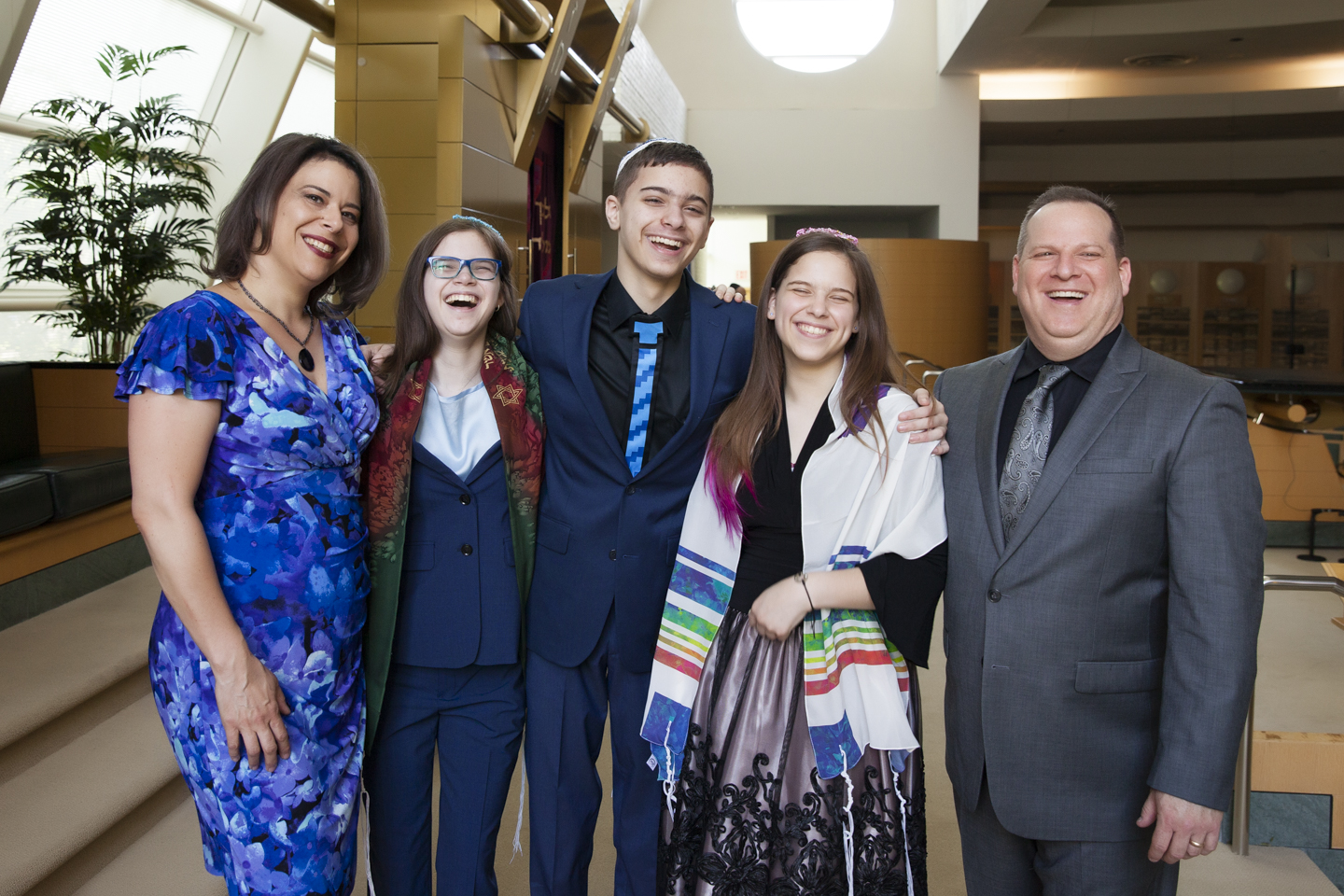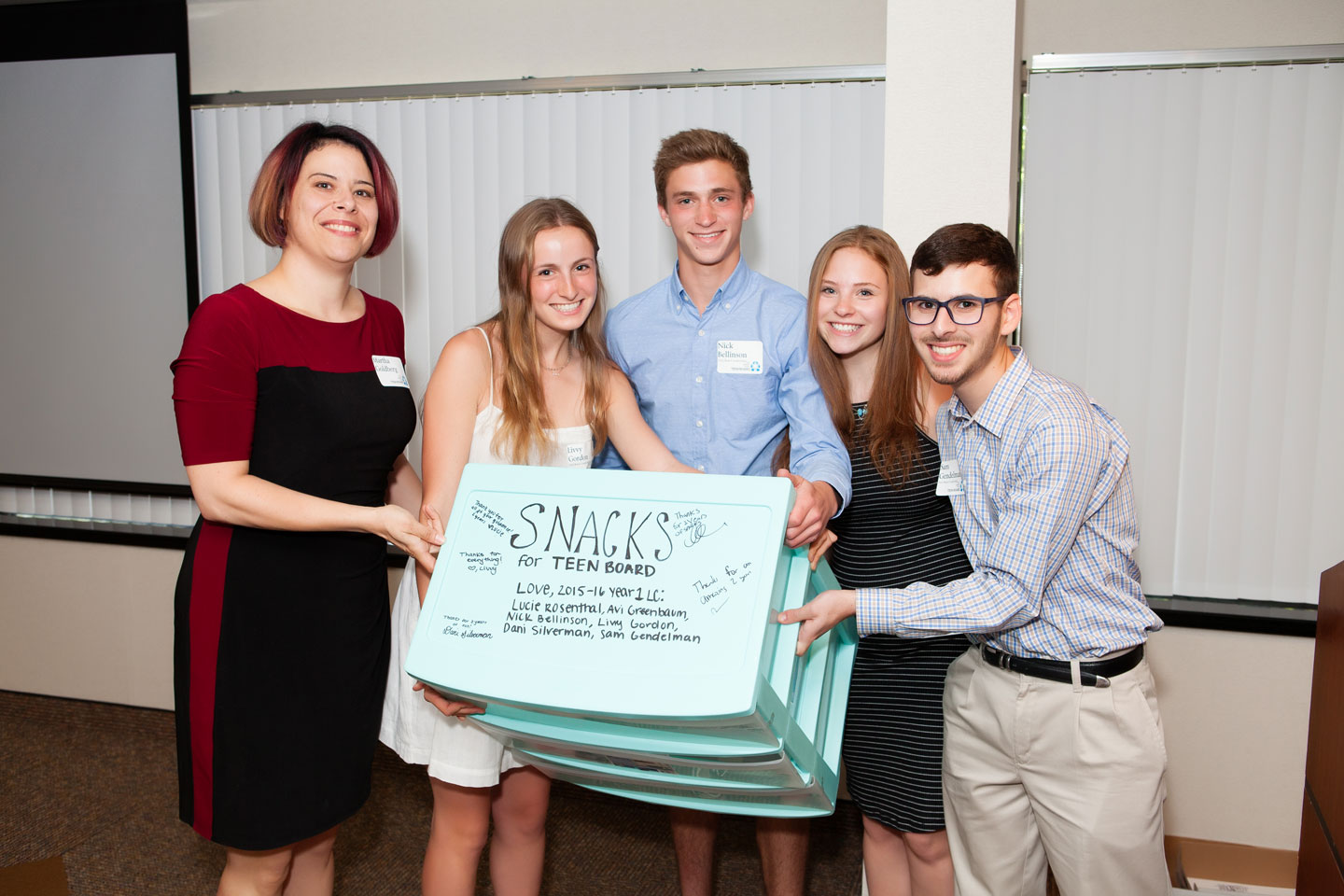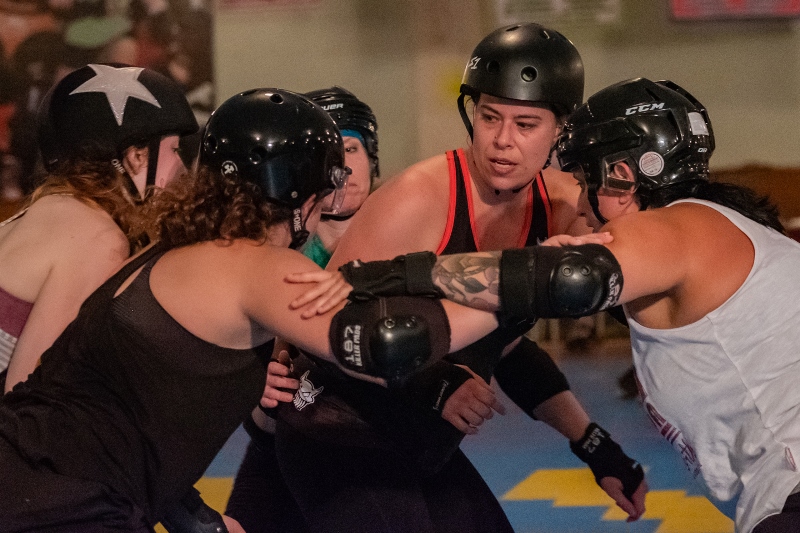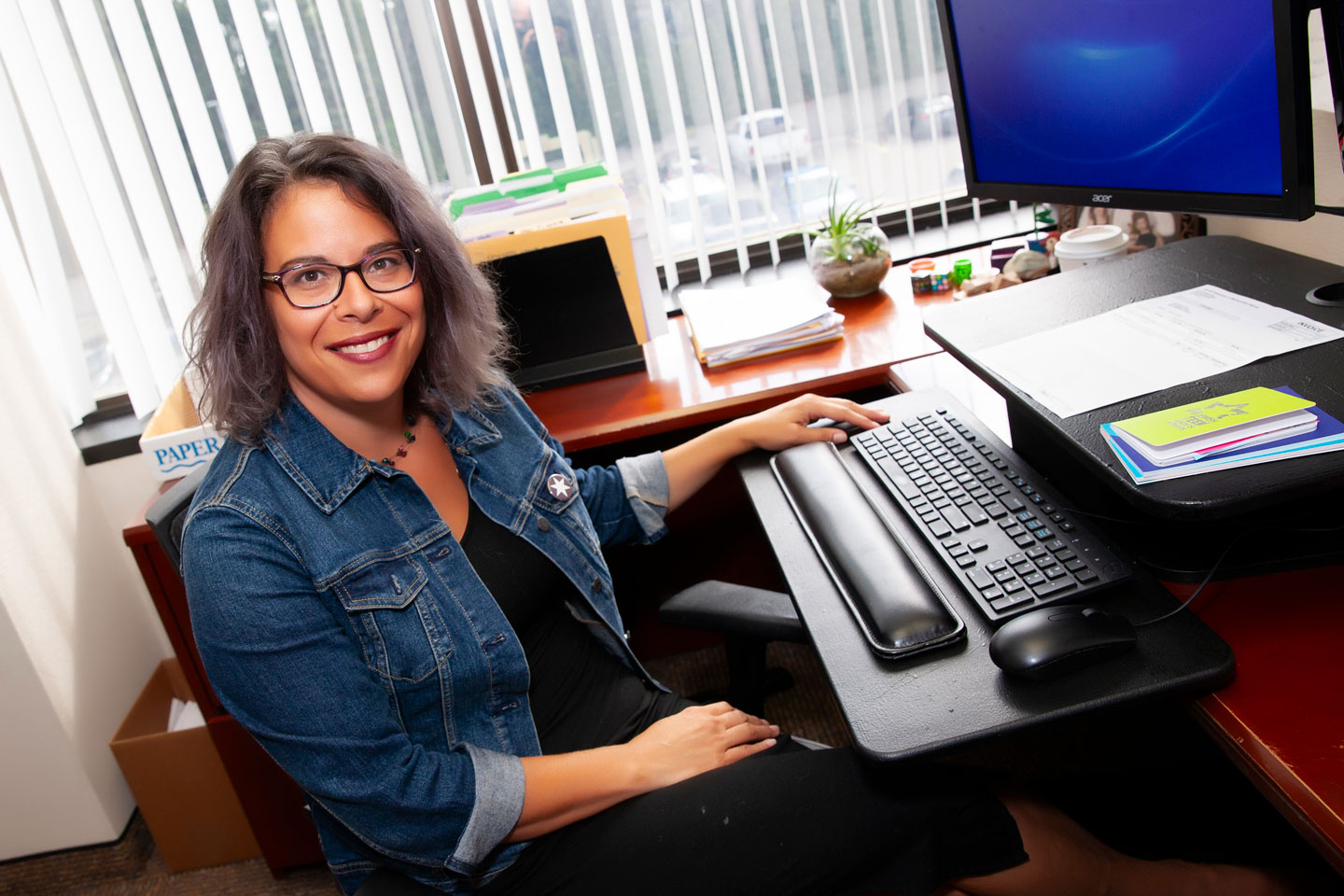by Vivian Henoch
It was a tall order with a worthy goal – to help “build the next generation of philanthropists, passionate about Jewish community, the future of Detroit and the wellbeing of some of the most vulnerable residents of the city.” As all initiatives in Jewish Detroit bring out the best of people, The Jewish Fund chose Martha Goldberg to head the startup of its Teen Board in 2014.
“Teens’ voices should be heard.”
“When an organization’s work impacts the world of teens, teens’ voices should be heard,” observes Martha. “If you listen carefully, teens will tell you what they are looking for and what fits their needs better than anyone else.”
Under Martha’s leadership, The Jewish Fund Teen Board has built a strong cohort of teens, now with nearly 100 alums who can attest to the challenges and long-range benefits of the program. Each year, the program recruits a new board, where teens have their say in how they work together to grant $50,000 to both Jewish and secular charities in Detroit. The program also allows for a deeper dive into grantmaking and philanthropy for those who have completed the first year and opt into a second-year experience. To date, the Teen Board has awarded grants totaling $250,000 to 16 organizations, focusing on areas ranging from teen mental health and substance abuse to domestic violence and the care of older adults.
Martha began her career at the Jewish Community Center of Greater Columbus, where she worked for more than 10 years coordinating and supervising programs for children, camping, early childhood education and interfaith outreach. Since returning to Michigan, she has held positions in the Women’s Philanthropy Department of the Jewish Federation of Metropolitan Detroit and at Congregation Shaarey Zedek.
With nearly two decades of experience in program planning, fundraising and outreach within the Detroit Jewish community, Martha has become a specialist in the niche of teen philanthropy and a recognized leader among professionals around the county due to the inclusion of The Jewish Fund in the Jewish Teen Fund Network’s Foundation Board incubator, which is generously funded by Laura Lauder and the Maimonides Fund.
Never one to stop learning (and leading the way), Martha holds a Bachelor’s Degree from the University of Michigan and a Master Degree in Social Work from Ohio State University; currently, she is working on her Master in Jewish Professional Studies at the Spertus Institute for Jewish Learning and Leadership in Chicago. Residents of Orchard Lake, Martha and her husband, Ross, are the parents of three teens – Abigail 12; Maya, 13; and Noah, 16.

In conversation with Martha (Mad-Eye) Goldberg
Q: In five words, what describes the Teen Board and your role?
A: Impactful, Jewish, empowering, meaningful, fun.
On choosing Judaism
myJewishDetroit: As you wish, please share a little about your background and your journey to Judaism.
I’m originally from the small town of Valparaiso, Indiana, but my family moved to Michigan when I was 12, so really I consider myself a Detroiter. I graduated from Mercy High School and didn’t have much exposure to the Jewish community until I got to college and met my husband, Ross, who is Jewish.
I grew up with the belief that religion and spirituality are so closely intertwined into every aspect of your family life, that it really doesn’t matter how religiously observant you are. When I met Ross, I felt that I needed to first sort out our different backgrounds and family traditions before we talked about a serious commitment, engagement and marriage down the road. So I started with my own interest in studying Judaism independently.
And the more I learned, the more I realized that I had a “Jewish soul” all along. I was born into a Christian family, but my journey on the road to Judaism was where I was meant to be. Everything I was learning about Judaism fit with my own world view.
Even though my Jewish exploration came about through my relationship with Ross, my conversion was a personal choice. I didn’t want the process to be placed in the context of “I’m marrying a Jewish person, so I’m converting.”
Q: Do you have advice for people considering converting to Judaism?
My work with the Jewish community always has had an outreach component and I’m happy to talk about my experience.
But I would never advise anyone to convert unless it’s their own personal commitment to a religion, a community and a life experience. Conversion is a life-altering choice and everyone in the extended family goes through a transition as well. For me, it was beshert, because I really felt I was meant to be Jewish. Following my graduation from U of M, I studied with Rabbi Robert Levy at Temple Beth Emeth in Ann Arbor to go through the conversion process.
On shifting gears (and not becoming an astronaut)
As an undergrad at U of M, I started in aerospace engineering and ROTC, because I dreamed of being an astronaut. But sometimes dreams can change.
I like to tell that story when I mentor young people, because it’s one of my life lessons: You think you are on one path — but if you pay attention to what the universe is telling you – and what you already know in your gut – you can find yourself at a crossroads taking an unexpected turn. I spent many years preparing to go to Michigan to be an engineer. But when I got there, my engineering classes did not engage me in the way I expected, and I found myself struggling in school for the first time in my life. But I was lucky; I had supportive parents who encouraged me to take the time to explore and to embrace the freedom to figure out what fits.
So, that’s how I became a psychology major. I was interested in how people interact — why they do what they do, and how to help them be productive and overcome their challenges. Once I completed my undergrad, I furthered my experience with a gap year working with homeless families as an AmeriCorps volunteer, followed by a Master’s Degree in Social Work from Ohio State.
Although I originally imagined myself becoming a traditional “therapist,” once again my path led me toward a Jewish destination. As Ross and I connected with a synagogue in Columbus and started engaging with the Jewish community there, people took notice of my involvement and suggested that I would be a good fit as a professional in the Jewish community.
Working in a Jewish agency was not exactly on my radar, but never one to turn away from a “sink or swim” opportunity, I committed to a summer job at the JCC Day Camp to figure things out. Next thing I knew, I was running the camp and starting down a path for the multiple roles I would take at the JCC for the next 12 years.
Q: What brought you back to Detroit?
Family ties and our kids. Our oldest was diagnosed with Asperger’s syndrome at age four and we looked to settle closer to family. Detroit seemed the natural fit. We moved back in 2008.
On The Jewish Fund Teen Board and lessons in leadership

Q: What drew you to the Jewish Fund Teen Board?
What I always say about the Teen Board – and the reason this is such a great position for me – is that it marries my passion for working in the Jewish community, my passion for social impact work and my desire to expose young people to what’s out there beyond their own circles of school, friends and family.
People joke that I’m always that person in charge. It’s true that people naturally turn to me and I naturally take responsibility. But I’m also a team player, a hard worker. I always like a challenge and thinking about the big picture in an organization. What drew me to the Teen Board initially, and what still fascinates me about the Teen Board program, is that it’s endorsed and nurtured by The Jewish Fund. When you consider that The Jewish Fund is a foundation, not an agency for youth programing, it’s remarkable what we’ve been able to accomplish with teen-driven leadership.
Q: How do you develop teen leadership skills?
When we talk about leadership and what qualities we look for in members of our Teen Board, one of the lessons in life I like to impart to our teens is this: Not everyone can be a leader. You can’t put 25 leaders around the table and expect to reach a consensus about anything or get all of the insights you need from the group.
There is so much pressure on young people to become leaders today. Yes, we need leaders in our organizations, but we also need the Devil’s advocate, the supporters, the conveners, the questioners, the consensus-builders and the observers who are listening to everyone and can summarize and reframe what the group is trying to do. Anyone developing their skills as a leader needs to think about how they can play all those roles around the table – because one needs to understand the dynamics of a group to truly lead.
Q: Beyond the qualities of leadership, what do you to look for in applicants for the Board?
We look for a diversity of experience and background for a mix around the table that creates a very different dynamic than other kinds of programming teens already may be exposed to. And we have a strong commitment to our program’s accessibility to anyone. Typically, the program attracts high achievers, those super-involved teens in community. But we also look for others who have yet to find their path into the Jewish community or their connections — but express their interest in community service or helping others who have more needs.
We strive to create an experience for our teens that teaches them to connect and build consensus with those who may have different backgrounds, different family values and different exposures to Judaism. Working among peers with different viewpoints, but shared goals, can be an empowering experience.
Q: How is the program different than other group projects or volunteer activities in the community?
The program is a commitment for an entire academic year; challenging students to work as professionals and to make decisions that have bearing on critical social issues in our community. Unlike any group project teens may have in school, the experience gives them the time and space to think about what’s important to them and explore philanthropy on their own terms.
We might have a conversation about domestic violence, for instance, and we hear teens say it’s not a real issue in the Jewish community. Then we have the opportunity for learning the facts and openly talking about issues where there are stigmas attached. It’s not always the curriculum on the paper where the real learning comes. Sometimes it’s just asking the questions: How does the world around us work or not work, and where can we make a difference?
Q: What achievements of the Board make you most proud?
Our teens are amazing, and I know that our program profoundly touches them when I see them come together as a unified, cohesive group – when they get into those deep conversations and then debate and deliberate about the impact of their decisions with a true desire to help the community.
I have the rare privilege to sit in and hear their reasoning for the areas of focus they choose. Last year, for the first time, our cohort chose to focus on the needs of older adults in our community. And to listen to teens share their stories about their own grandparents – to learn from one another – and to gain the kind of insights that turn into action – wow, that’s when we know the program is working.
Other highpoints of the program are the site visits. We spend six months learning and preparing our Teen Board members to conduct a thoughtful interview. And the feedback we get certainly confirms we’ve done our job. The professionals often tell us that our participants come in with some of the most challenging and thorough questions they’ve ever had in a site visit.
On parenting teens
Q: As a mom with teens, what do you see as some of the challenges facing parents today?
Keeping track of what’s going on with them when they spend so much time clicking through social media on their devices. It seems to me that my teens spend much more time home than I did when I was a kid. We’d just get on our bikes and ride to our friend’s house; our kids connect on their devices, texting, Facetiming or Skyping with their friends. Because they spend so much time in that sphere, and because there’s so much out there to explore, it’s up to a parent to know what conversations to be having with them. You want to trust your children, but still you want to be sure they are educated on the pitfalls of social media.
There’s a learning curve here for everyone today, both inside and outside the device world. As the next generation comes into the work place, I think we’re going to see a lot of shifting—because of their own lifestyle and comfort with technology.
Keeping up with all the school work – and the pressures for our kids to “fill” their time with important “resume-worthy” work – has a huge impact on family life. It’s hard for parents to know when enough is enough.
I still believe it’s okay for kids to be kids, that they should have an adolescence and be given time to discover what makes them unique. I have two kids out of three who have some challenges — so my parenting style is free and relaxed. I am still committed to the idea that young people need a mix of fun and free time, as well as those structured experiences which are geared toward college- prep.
“Embrace your weirdness.” In our family those are words to live by. I want our kids to know what makes them special – and hold on to that light that makes them shine. Too many teens have that drilled out of them. That “weirdness” so often leads adolescents to their passion and to the voice that they will have in the world.
Q: Please share a few words about your kids
Ross and I often joke that there are too many geniuses in our family for our own good. Our son is a computer whiz-kid, likely to be a tech genius someday. Our middle daughter, Maya, is a budding marine biologist, loves animals and calls her cats her children. Our youngest daughter is the closest we have to “typical” teen girl, our social butterfly . .. . another kind of challenge for us.
Martha on skates: the fun stuff

Q: Why roller derby and what drew you in?
Proof positive that you can start anything at any age when you put your mind to it, I took up the sport six years ago at the age of 39. I was at a brief hiatus in my career when I stepped back from full-time work to devote more time to my kids. I was open to adventure. And, like all things in my life, I found myself at the right place at the right time. I was at a parade with my kids when a dozen very strong and cool-looking women came flying by on skates. And it just so happened that they skated in a rink close to home and they were recruiting.
Q: Were you active in sports before?
Not really, but I always was active and kept fit at the gym. Roller derby seems like a cool thing to try and a fun outlet for fitness and mental health.
What instantly attracted me to the sport was the spectrum of community and the spirit of team play. Roller derby is one of the few sports that is accessible to players of all skills, all ages, all ethnicities. We have players from 18 years old to 50+. My league, Detroit Roller Derby, has skating opportunities for everyone identifying as female, as well as a co-ed junior team for ages 7 to 17.
And what I’ve learned from being in that community is something that I would not have gotten anywhere else – and that is intense mental toughness and complete focus on the moment. When I am skating, whatever is happening in the world outside the rink is gone. Roller derby is an adrenaline rush – my own a space in the world that is free from all the distractions – where I am pushing myself in a way that I never have before.
I started on a rec team for pure fun in a sport I didn’t know the first thing about and today I’m an AllStar player in tournaments around the country. Physically and mentally the sport takes constant practice, patience with yourself and perseverance – all lessons for the big picture in life. Love it!
Favorites
Junk food: Candy (I need sugar for Roller Derby). Preferences? Anything Reese’s and cherry blow pops
Health food: Partial to Indian food or a really good salad
Family activity: Exploring nature
Places to take kids or visitors: RenCen RiverWalk, Downtown Detroit, where so many cool, fun things are happening.
Vacation spot: Outer Banks, North Carolina
Binge tv: Glow, Riverdale (to watch with my daughter because she’s obsessed with the show) Orange is the New Black, Grace and Frankie. (When I grow up I want to be Lily Tomlin – would like to live in a giant beach house and do art all day.)
Reading now: I and Thou, Essays, and The Education of Character, by Martin Buber
Words to live by: Embrace your weirdness.




